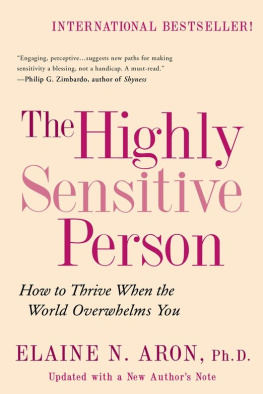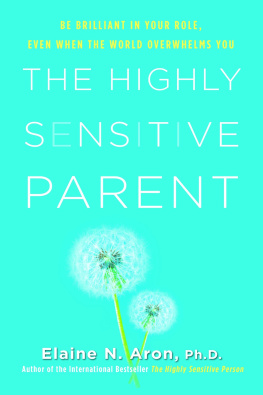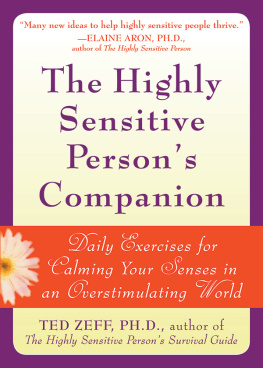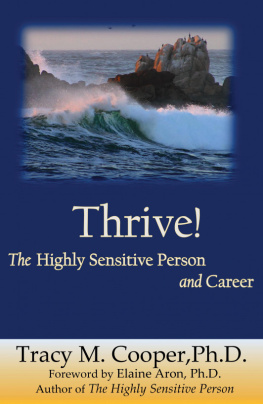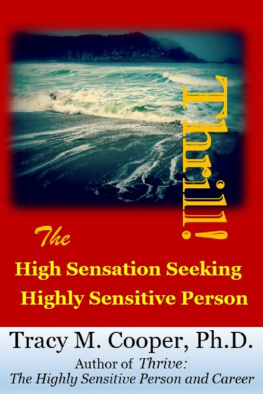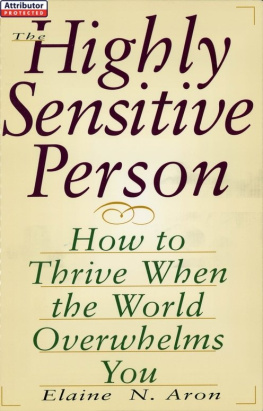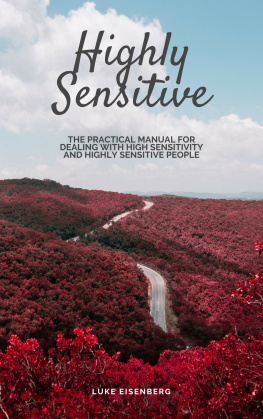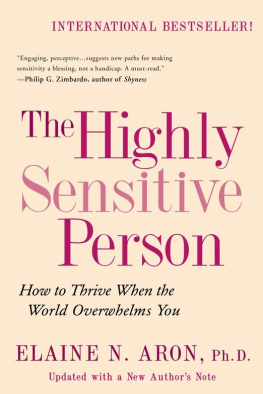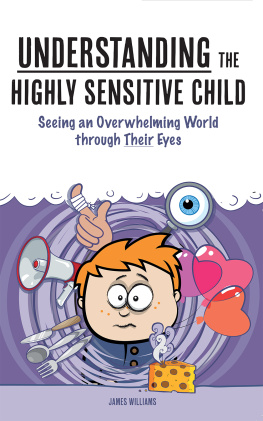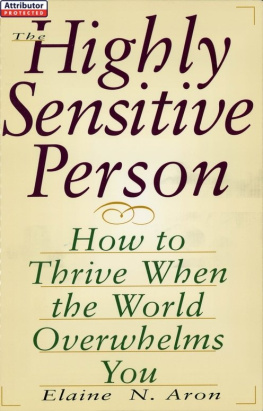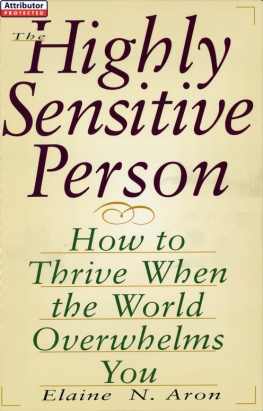Also by Elaine N. Aron, Ph.D.
The Highly Sensitive Person
The Highly Sensitive Persons Workbook
To my husband, Art
To my son, Elijah
To similar loving persons in the lives of my readers
Acknowledgments
I am so fortunate to have had Tracy Behar as my editor and Betsy Amster as my agentboth have been kindly and intelligently exacting during the long process of coaxing me to put down and clarify everything that my buzzing HSP brain had worked out in such depth about love and temperament. Editor Sarah Whitmire also gave the manuscript a good going over, as did my husband, Art. I also appreciate the work on the text done by my son, Elijah.
Great thanks also go to the HSPs who were willing to be grilled by me for hours about their relationships and to the many more who answered my surveys. I am also grateful to those who have come to me for psychotherapy. When I needed to tell a part of their stories in these pages, I jumbled the facts wildly while preserving the insights. These stories were the only way to add the depth this book required. I feel highly privileged to have been present while they unfolded.
Introduction
The effect of the inherited personality trait of high sensitivity on love is not a purely scientific interest of mine. I have lived it, and it has taught me, whether I wanted to learn or not. So while my own case illustrates only one way in which sensitivity affects a relationship, it does bring to life the deep reach of this neglected influence on love.
SCHOOLED BY DIFFERENCE
My husband, Art, a social psychologist, is a restless sort. If he goes out for a walk alone, he wears a Walkman. But hed rather walk with me.
I am rather fond of walking alone. And I can drive five hours by myself and never turn on the radio. Im just thinking.
Art is great when under pressure. Theres no one Id rather have in a crisis; he walks in and handles it all. But he can also enter the same room a hundred times and not notice that turning off the fluorescent lights and straightening the rug would make it nicer. Sensing the subtle ways to improve a situation comes naturally to me.
When we go to a conference, hes out there socializing from breakfast until two in the morning, going from group to group. I go to the sessions, maybe join him at dinner or for a party, but mostly I am in my room, outdoors walking, or having a long conversation with some other loner.
To Art, every action is spiritual. Everyday life is sacred. I am always wanting to withdraw, feeling torn between outer demands and the rich, spiritually tantalizing world I only find when I turn within.
I tease him about the time he asked me where I got that beautiful new print in the kitchenthe one that had been hanging there for a year and a half. But he doesnt tease me about much of anythingI would take it too hard.
We both can work sixteen hours straight if we have to. I hate it; hes okay with it. When I go to rest, Im wide awake, too overstimulated to sleep. He gets into bed beside me and in half a minute hes slumbering like a grizzly in winter.
Art does not dream as often as I do. His dreams are happy, or they are about organizing things. My dreams are powerful, sometimes disturbing.
So for years we both thought of me as strangely intense, him as not very in touch. But of course I thought about all that more intensely too. I vacillated between seeing myself as sick and him a miracle of mental health, and me as a genius cramped by a husband who was frustratingly shallow and unconscious. Of the two viewpoints, I actually preferred seeing myself as the problem. I so much wanted to love my husband. But sometimes I longed for a deeper partner, one who could lead me to God perhaps. Meanwhile, Art might have enjoyed a more spontaneous, outgoing mateone who would talk more, take more pleasure in life. But he was not really bothered by our differences. I was.
I was unhappy with myself too. I truly thought there was something wrong with me, although to Arts credit, he never did. He liked my intensity, creativity, intuition, preference for deep thinking and conversation, awareness of subtleties, the intense emotions. I saw these as acceptable surface manifestations of a terrible, hidden flaw I had been aware of all my life. From my perspective, by some miracle he loved me in spite of it.
In other ways we are hardly total opposites, of course. Nor is this book only about love between a highly sensitive person (HSP) and a non-HSP. Much of it is about HSPs loving themselves and one another. Further, Art is not highly nonsensitive. He dislikes crowds, hates violent movies, loves the arts. Hes very conscientious and consistently seeks to be attuned to others and to his inner life. On the HSP Self-Test, he scores around a ninea middle score (middle scores are actually not the most commonmostly people are HSPs or not). And he loves love, intimacy, closeness. In fact, our main area of research has been and still is love and close relationships.
Yet until a few years ago, privately I wasnt always sure I wanted to be close or could be close to anyone. Mostly I reined in my negativity, another part of the seeming flaw, until a midlife crisis spewed it all over. This period was very hard on Art, as I became pretty blunt about my dissatisfactions. But it also broke open the way toward a resolution of our difficulties, and to this book.
ENTER THE HIGHLY SENSITIVE PERSON
The breakthrough came when the psychotherapist I turned to at this time casually mentioned to me that I was highly sensitive. The lights went on. Could this be my apparent flaw? And not a flaw after all? And so began my study of highly sensitive persons.
For those of you new to the concept, HSPs are that 15 to 20 percent of the human population born with a nervous system genetically designed to be more sensitive to subtleties, more prone to deep reflection on inner experience, and therefore inevitably more easily overwhelmed by outer events. Well get to the details of the trait in . By the way, this is not just my idea but one well established through research by others too. The main point to understand in this introduction is that I am not talking about a little quirk here, but a major, normal, inherited difference in how the entire nervous system functions, affecting every aspect of life. It is present in about a fifth of the population, and to some degree in a much larger percentage; thus if people were matched randomly, the chance of a relationship being affected by the trait is at least 36 percent.
What matters to you right now, of course, is whether you and/or your partner is an HSP. Take the HSP self-and partner-tests, along with the second pair of tests, which involve another inherited traitsensation seekingalso discussed in .
As I have interviewed, conducted surveys, consulted with, and gathered questionnaires from thousands of people, I have found that both my own life and my marriage make infinitely more sense to me now. More and more, I can love and respect both myself and my husband, different as we are. Indeed, I can see now that facing our deep-rooted temperament differences has schooled us, developed our characters, and added passion and pleasure to our lives in a way that nothing else could have.
This book speaks from my strong personal experience that we HSPs and our partners, HSPs or non-HSPs, need help thinking through the meaning of our intensity and our differences. Without this help, love and close relationships can bring HSPs bitter disappointment, and in the process we can unwittingly inflict suffering on others. But with help, we HSPs are ideally designed to make an unusually bountiful contribution of love to our families and the world.
Next page

